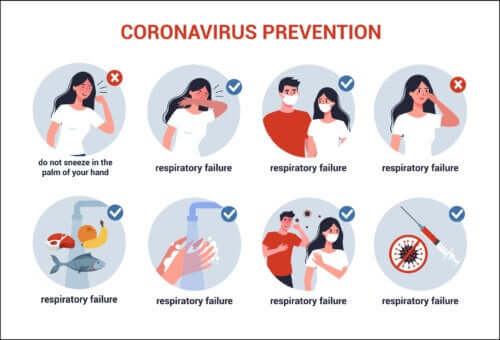Do School Closings Slow the Spread of Coronavirus?


Written and verified by the psychopedagogue María José Roldán
By now, all of us have heard of coronavirus because information about the illness is everywhere you look. However, sometimes having so much access to this information can cause fear and confusion. Never has a virus had such an impact on a social and economic level. We’re in the midst of a pandemic due to the new coronavirus SARS-CoV-2. So, what measures can we put into place in order to slow down the spread of coronavirus?
This isn’t the first time the world has faced viral epidemics. There have been others, for example, Ebola and bird flu, just to name a few. But the number of deaths from coronavirus or COVID-19 continues to increase, especially among the elderly and those with associated health problems. It seems like the numbers keep growing and the fear in society is evident.
Until when?
There’s no precise response to how long this virus could remain among us. Nor do experts know if this is a seasonal virus that returns with the arrival of cold weather. What’s more, scientists are unsure of whether or not this virus could mutate or turn into a virus that’s more aggressive than it is now. There are many people who want to know the latest information in real-time.
Some experts point to the sun and heat to reduce the aggressiveness of the virus, as this reduces agglomeration in closed spaces. What’s more, it appears that the virus has a hard time reproducing in higher temperatures.

Some individuals will become infected, some will experience symptoms while others will remain asymptomatic. The good news is that suffering this illness and overcoming it may create immunity in the case of repeated exposure. However, this is something scientists must investigate further.
Social distancing to stop coronavirus
Health and sanitation authorities recommend social distancing in order to reduce the risk of spreading the illness. This also impedes the infection from spreading massively. If spreading occurs, it’s better for it to take place gradually in order not to overwhelm medical services… Who, by the way, are already realizing the disasters that this pandemic is causing.
Patients with serious cases should receive medical attention as efficiently as possible. At the same time, milder cases should receive medical attention from home. This way, health services, and emergency services, in particular, won’t be overwhelmed. The less that people interact, and the more people move away from groups, the lower the risk will become.
To reduce people’s movement and avoid agglomerations, Italy and China have both closed their borders. This measure helps to reduce the spread of coronavirus. Furthermore, many educational centers, from daycares to universities, have closed in different cities around the world for a lapse of two weeks.
School closings for fear of the spread of coronavirus
The decision to close schools and other educational institutions for fear of coronavirus limits the movement of parents and other relatives that take their children to and from school. This helps prevent contact among individuals, especially those who may be carrying the disease.
In the same way that many schools are closing, officials are also canceling large gatherings, especially shows, sports competitions, and conferences. There is also a reduction and, in some cases, suspension of public transport. Experts recommend canceling gatherings of more than 10 people in closed spaces.

The danger of coronavirus among the elderly
Although coronavirus looks like a cough or the flu in most cases, there is a segment of our population that may develop severe pneumonia, which puts their lives at risk:
- The elderly
- People with chronic illnesses
- People with cancer
- Patients taking immunosuppressants
- Pregnant women
It’s important that every person does what he or she can to make things easier for everyone. Businesses should facilitate teleworking and phased working schedules to avoid overcrowding. This way, the exposure and interaction between individuals will stay at a minimum.
If you have any flu-like symptoms, it’s important not to go to work and to stay home to avoid spreading the disease. And, of course, consult your doctor. Any employees diagnosed with SARS-CoV-2 must stay home from work and notify friends and the workplace immediately.
And finally, it’s important to avoid frightening children and to follow the instructions of health professionals. One of the best things you can do to prevent the spread of coronavirus is washing your hands often and coughing into your elbow.
By now, all of us have heard of coronavirus because information about the illness is everywhere you look. However, sometimes having so much access to this information can cause fear and confusion. Never has a virus had such an impact on a social and economic level. We’re in the midst of a pandemic due to the new coronavirus SARS-CoV-2. So, what measures can we put into place in order to slow down the spread of coronavirus?
This isn’t the first time the world has faced viral epidemics. There have been others, for example, Ebola and bird flu, just to name a few. But the number of deaths from coronavirus or COVID-19 continues to increase, especially among the elderly and those with associated health problems. It seems like the numbers keep growing and the fear in society is evident.
Until when?
There’s no precise response to how long this virus could remain among us. Nor do experts know if this is a seasonal virus that returns with the arrival of cold weather. What’s more, scientists are unsure of whether or not this virus could mutate or turn into a virus that’s more aggressive than it is now. There are many people who want to know the latest information in real-time.
Some experts point to the sun and heat to reduce the aggressiveness of the virus, as this reduces agglomeration in closed spaces. What’s more, it appears that the virus has a hard time reproducing in higher temperatures.

Some individuals will become infected, some will experience symptoms while others will remain asymptomatic. The good news is that suffering this illness and overcoming it may create immunity in the case of repeated exposure. However, this is something scientists must investigate further.
Social distancing to stop coronavirus
Health and sanitation authorities recommend social distancing in order to reduce the risk of spreading the illness. This also impedes the infection from spreading massively. If spreading occurs, it’s better for it to take place gradually in order not to overwhelm medical services… Who, by the way, are already realizing the disasters that this pandemic is causing.
Patients with serious cases should receive medical attention as efficiently as possible. At the same time, milder cases should receive medical attention from home. This way, health services, and emergency services, in particular, won’t be overwhelmed. The less that people interact, and the more people move away from groups, the lower the risk will become.
To reduce people’s movement and avoid agglomerations, Italy and China have both closed their borders. This measure helps to reduce the spread of coronavirus. Furthermore, many educational centers, from daycares to universities, have closed in different cities around the world for a lapse of two weeks.
School closings for fear of the spread of coronavirus
The decision to close schools and other educational institutions for fear of coronavirus limits the movement of parents and other relatives that take their children to and from school. This helps prevent contact among individuals, especially those who may be carrying the disease.
In the same way that many schools are closing, officials are also canceling large gatherings, especially shows, sports competitions, and conferences. There is also a reduction and, in some cases, suspension of public transport. Experts recommend canceling gatherings of more than 10 people in closed spaces.

The danger of coronavirus among the elderly
Although coronavirus looks like a cough or the flu in most cases, there is a segment of our population that may develop severe pneumonia, which puts their lives at risk:
- The elderly
- People with chronic illnesses
- People with cancer
- Patients taking immunosuppressants
- Pregnant women
It’s important that every person does what he or she can to make things easier for everyone. Businesses should facilitate teleworking and phased working schedules to avoid overcrowding. This way, the exposure and interaction between individuals will stay at a minimum.
If you have any flu-like symptoms, it’s important not to go to work and to stay home to avoid spreading the disease. And, of course, consult your doctor. Any employees diagnosed with SARS-CoV-2 must stay home from work and notify friends and the workplace immediately.
And finally, it’s important to avoid frightening children and to follow the instructions of health professionals. One of the best things you can do to prevent the spread of coronavirus is washing your hands often and coughing into your elbow.
This text is provided for informational purposes only and does not replace consultation with a professional. If in doubt, consult your specialist.








